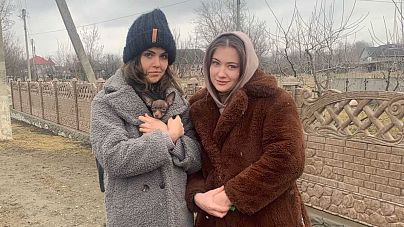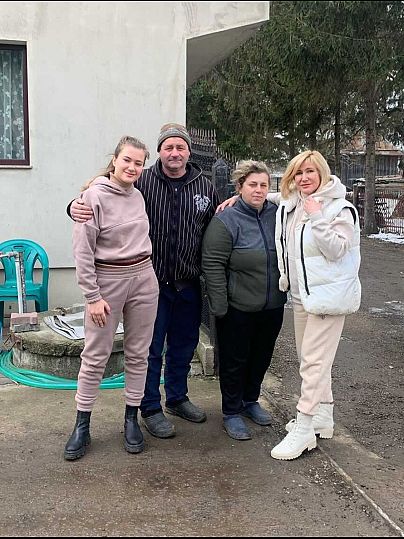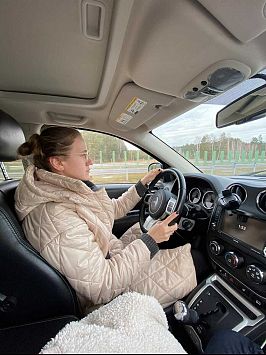Ukrainians who fled Kyiv for the EU fear for the family they've left behind as Russia's war rages on.
Yelyzaveta Pulvas, 23, begged her grandmothers to leave Kyiv in the days after Russia’s invasion of Ukraine, but to no avail.
She said her 86 and 88-year-old grandmas did not want to travel west, arguing Kyiv was their home and they wouldn’t leave.
"I was shaking them and saying oh my God, you don't understand you will die here. You know the missile will hit your house and there will be no grandma for me, and I love you. Don't do this to me, but they said no," Pulvas said.
"You leave everything, you leave your house, you leave your life, you leave everything,” she added of her decision to flee the country with her mother.
The communications specialist is now safe in Romania and one of more than two million Ukrainians who have left the country since the war began.
Some 1.7 million of them went to neighbouring EU countries, according to a UN tally.
Svitlana Maistruk, a 33-year-old communications expert, also fled Kyiv after the war broke out and is now trying to help the effort from Warsaw, Poland, after working for years to promote democratic reforms in Ukraine.
Her husband and brother stayed behind to help drive humanitarian aid across the country and get people to safety.
Among Maistruk's friends, often older parents and grandparents stayed behind, not wanting to leave their homes.
Maistruk's mother is staying in Ukraine as well as her husband's parents who live close to the frontline in the east.
"This is a common problem for all my friends because their parents didn't want to leave their homes.. of course, it's their choice and we have to respect it but we hope that the Ukrainian army will fight back."
Sheltering in Kyiv
When the war broke out at the end of February, Pulvas spent three days sheltered in a bunker in Kyiv before fleeing for neighbouring Romania.
“I got older by like four, five, 10 years. I can even see it in the look on my face because I never thought this would happen,” Pulvas said. “It is some parallel reality,” she added.
Pulvas said she was not sleeping when she saw parts of Russian President Vladimir Putin’s statement two weeks ago, announcing that Russia would launch a “military operation” in Ukraine. Shortly afterwards, she remembers hearing explosions as the war began.
“I was shaking, and I couldn't bring myself together and I took some sedative pills because I understood that my father is away…so it is just me, my mum and grandmothers,” she said.
“All the responsibility for my family is on me,” she added, saying for the first couple of days she didn’t sleep at all and instead worked nonstop, translating information and helping out how she could.
The scariest part during that time was sheltering in a bunker in Kyiv and hearing explosions, but even then, what struck her about the war was people’s humanity.
“The one thing about sheltering is that people were so united and so good. We share everything. No one said like, 'it's my water or my food',” Pulvas said.
She said it was also people's humanity that touched her as she and her mother drove for 36 hours without sleep until they reached the border.
“We were so touched. We cried like two or three times during this war and only because of the kindness of people,” she said.
'We had a plan'
Maistruk started believing there would be a full-scale invasion in February and after hearing Putin's speech on Ukrainian history, she came up with a plan to evacuate, preparing a bag with documents and medicine.
After she heard explosions in Kyiv on 24 February, she, her husband and friends left immediately.
It would take them roughly five days to drive across the country, stopping to see her mother on the way, before she crossed the border with Poland.
"I don't know whether we can describe it as depression because we were completely lost and devastated and upset," she said about how those early days felt.
"Sometimes we even wanted to cry but we couldn't cry because of all this emotional pressure." She thinks it's lucky, however, that they left the capital city early and had a plan in place.
Russian relatives ‘in total denial’
Maistruk said she knows of many people, including herself, who didn't hear from relatives in Russia when the war broke out.
"I know that they are scared because they have a completely different regime and we cannot understand how to live in a country which is not free," she said.
"But at the same time, (my uncle) could just send a message and ask how are you?"
Pulvas said that while at first her relatives in Russia did not think that there was a war in Ukraine, they have since come to believe her.
“First, they were in total denial. And then the days (were) passing, and they understood that everything we say is right,” she said of her relatives.
Pulvas noticed that Russian television had focussed a lot on Ukraine since the annexation of Crimea in 2014 and the beginning of the war in the Donbas. As a communications specialist, she says she understands how well propaganda works.
“I don't have any aggression towards Russian people. I'm angry just (at) one person who is Vladimir Putin.”
But for her, there is still hope for Ukraine, even if right now, she does not know what comes next.
“We don't want to live in Putin's Russia. So we're protecting democracy and we are protecting basically the whole Europe now,” she said.














